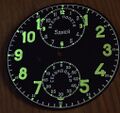Machine (nonfiction): Difference between revisions
| (7 intermediate revisions by the same user not shown) | |||
| Line 1: | Line 1: | ||
[[File:Machine Dard 376px.jpg|225px|thumb|19th century advertisement for L. Dard, Constructeur-Mechanicien -- a specialist in using machines to make other machines.]]A '''machine''' is a tool containing one or more parts that uses energy to perform an intended action. | [[File:Machine Dard 376px.jpg|225px|thumb|19th century advertisement for L. Dard, Constructeur-Mechanicien -- a specialist in using machines to make other machines.]]A '''machine''' is a tool containing one or more parts that uses energy to perform an intended action. | ||
Machines are usually powered by mechanical, chemical, thermal, or electrical means, and are often motorized. | Machines are usually powered by mechanical, chemical, thermal, or electrical means, and are often motorized. | ||
A simple machine is a device that simply transforms the direction or magnitude of a force, but a large number of more complex machines exist. | A simple machine is a device that simply transforms the direction or magnitude of a force, but a large number of more complex machines exist. | ||
The word ''machine'' derives from the Latin word ''machina'', which in turn derives from the Greek (Doric μαχανά ''makhana'', Ionic μηχανή ''mekhane'' "contrivance, machine, engine", a derivation from μῆχος ''mekhos'' "means, expedient, remedy"). | The word ''machine'' derives from the Latin word ''machina'', which in turn derives from the Greek (Doric μαχανά ''makhana'', Ionic μηχανή ''mekhane'' "contrivance, machine, engine", a derivation from μῆχος ''mekhos'' "means, expedient, remedy"). | ||
A wider meaning of "fabric, structure" is found in classical Latin, but not in Greek usage. | A wider meaning of "fabric, structure" is found in classical Latin, but not in Greek usage. This meaning is found in late medieval French, and is adopted from the French into English in the mid-16th century. | ||
This meaning is found in late medieval French, and is adopted from the French into English in the mid-16th century. | |||
In the 17th century, the word could also mean a scheme or plot, a meaning now expressed by the derived machination. The modern meaning develops out of specialized application of the term to stage engines used in theater and to military siege engines, both in the late 16th and early 17th centuries. | |||
The word ''engine'' used as a (near-)synonym both by Harris and in later language derives ultimately (via Old French) from Latin ''ingenium'' "ingenuity, an invention". | The word ''engine'' used as a (near-)synonym both by Harris and in later language derives ultimately (via Old French) from Latin ''ingenium'' "ingenuity, an invention". | ||
== | == In the News == | ||
<gallery mode="traditional"> | |||
File:Luminous dial of Soviet aircraft chronometer.jpg|link=Chronometer (nonfiction)|[[Chronometer (nonfiction)|Chronometers]] are more than machines for [[Measurement (nonfiction)|measuring]] [[Time (nonfiction)|time]], says chronometer. | |||
File:IF-THEN-ELSE-END flowchart.svg.png|link=Artificial intelligence (nonfiction)|[[Artificial intelligence (nonfiction)|Artificial intelligence]] not showing off, can't help being smarter than other machines. | |||
</gallery> | |||
== Fiction cross-reference == | == Fiction cross-reference == | ||
| Line 33: | Line 24: | ||
* [[Gnomon Algorithm]] | * [[Gnomon Algorithm]] | ||
== External links | == Nonfiction cross-reference == | ||
* [[Artificial intelligence (nonfiction)]] | |||
External links: | |||
* [https://en.wikipedia.org/wiki/Machine Machine] @ Wikipedia | * [https://en.wikipedia.org/wiki/Machine Machine] @ Wikipedia | ||
Latest revision as of 10:53, 13 July 2016
A machine is a tool containing one or more parts that uses energy to perform an intended action.
Machines are usually powered by mechanical, chemical, thermal, or electrical means, and are often motorized.
A simple machine is a device that simply transforms the direction or magnitude of a force, but a large number of more complex machines exist.
The word machine derives from the Latin word machina, which in turn derives from the Greek (Doric μαχανά makhana, Ionic μηχανή mekhane "contrivance, machine, engine", a derivation from μῆχος mekhos "means, expedient, remedy").
A wider meaning of "fabric, structure" is found in classical Latin, but not in Greek usage. This meaning is found in late medieval French, and is adopted from the French into English in the mid-16th century.
In the 17th century, the word could also mean a scheme or plot, a meaning now expressed by the derived machination. The modern meaning develops out of specialized application of the term to stage engines used in theater and to military siege engines, both in the late 16th and early 17th centuries.
The word engine used as a (near-)synonym both by Harris and in later language derives ultimately (via Old French) from Latin ingenium "ingenuity, an invention".
In the News
Chronometers are more than machines for measuring time, says chronometer.
Artificial intelligence not showing off, can't help being smarter than other machines.
Fiction cross-reference
Nonfiction cross-reference
External links:
- Machine @ Wikipedia


